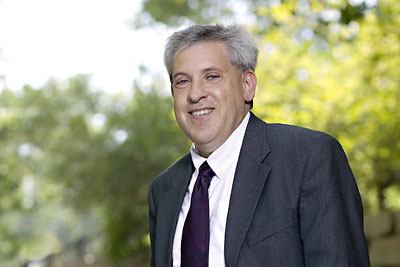New Human Ecology dean takes hands-on approach
By Sheri Hall

When Alan Mathios, the new Rebecca Q. and James C. Morgan Dean of the College of Human Ecology, received his doctorate degree from the University of Pennsylvania in 1985, he faced a difficult decision.
As a promising young economist, he was landing interviews at such impressive universities as the Massachusetts Institute of Technology, University of California-Los Angeles and the University of Chicago. But he yearned to have a more immediate impact on people.
"I wanted to understand the meaning of research in the real world, not just work in the ivory tower," he explained, which is why he decided to work as a staff economist at the Federal Trade Commission (FTC). "At the time, it was viewed as a very risky and maybe unwise decision," he said.
That gutsy move ultimately paved the way for Mathios to return to academia on his own terms. Now as dean, Mathios is in a stronger position to deliver the kind of hands-on learning experiences that he craved as a student; and he hopes to strengthen his college's integration of education, research and outreach, and ultimately, help students learn how to have an impact on the world.
From humble beginnings
Mathios grew up in a two-bedroom apartment in Queens with his father, a garment-shop owner on the lower east side of Manhattan; his mother, an administrative assistant; and his older sister. The dining room doubled as his bedroom.
As a psychology major at SUNY-Buffalo, Mathios said he became fascinated with the ability of economics to explain human behavior. He added a second major in economics and went on to pursue a doctorate degree. After seven years at the FTC, he was encouraged by the late Cornell Professor Scott Maynes, who was working at the FTC on sabbatic leave from Cornell, to consider academia again.
"Initially, I wasn't interested," Mathios said. "But out of all of the institutions out there, the College of Human Ecology … clearly stood out because of its commitment to research with real-world applications and integration of that research into the education component.
"It took a couple of years to convince me, and I'm forever grateful to Scott and the college for their patience and persistence in the recruiting effort," Mathios said.
He joined the college in 1992 as an associate professor of consumer economics and housing, and over the years taught economics of consumer law, public policy and marketing and intermediate microeconomic theory.
"It was my first time teaching, and I absolutely fell in love with it," he said. "My experience working in government really helped me make the material real for students. And the connections with government allowed me to help students discover job opportunities they might not have considered otherwise."
After working on the undergraduate curriculum in consumer economics and the new undergraduate program for the Department of Policy Analysis and Management (formed when the Department of Consumer Economics and Housing merged with the Department of Human Service Studies), Mathios was named associate dean for academic affairs in 2004.
"My favorite part about that role was building an esprit de corps among the dean's group and the senior staff," he said. "I believe very strongly in the value of teamwork. As a leader, if you have to rely on the authority of your position to motivate people, you're not going to get very far."
A drive to expand horizons
Mathios' penchant for learning new things -- he picked up the piano a number of years ago and still takes weekly lessons -- carries over to his work. Since taking on the role of interim dean last year, he's made it his mission to encourage the kind of cross-disciplinary collaborations that create opportunities for faculty to learn from their peers in other fields.
As a result, his college has become more deeply involved in such multidisciplinary initiatives as a collaboration with the College of Engineering and Weill Medical College on tissue engineering; with the Department of Psychology and the Law School; and with about 70 faculty members across campus affiliated with the Cornell Population Program, a universitywide demography center.
"These programs are a fantastic way that we can contribute to the university and boost the profile of the work we're doing," he said. "Even more importantly, I believe these collaborations are where the major breakthroughs happen."
Mathios' plans for the future also include overseeing the successful completion of the new Human Ecology Building and examining future facility needs, such as creating a space that will unite the Division of Nutritional Sciences.
That's a full plate of responsibilities, but it's one he comes prepared to handle.
"I am honored, humbled and excited to be entrusted with the responsibility of leading the college," he said. "I hope to approach the role with energy, patience and definitely a sense of humor."
Sheri Hall is assistant communications director for the College of Human Ecology.
Media Contact
Get Cornell news delivered right to your inbox.
Subscribe